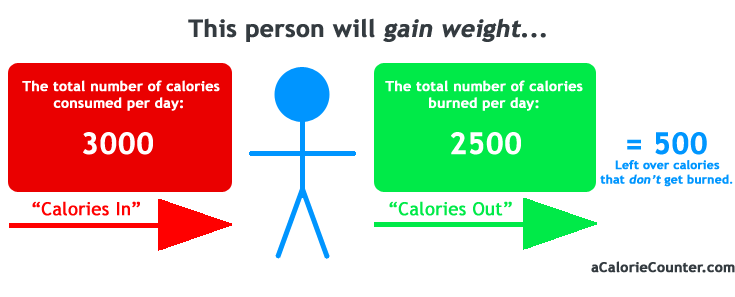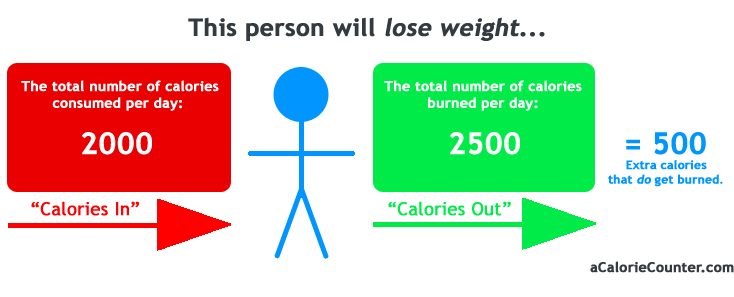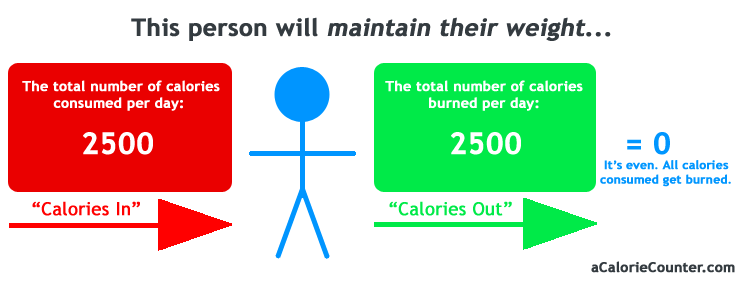Calorie Counting - A Guide to Calories & Weight Control
Hello. If you are here, then it's most likely because you want to do something with your weight. Since there are really only three things you can actually do with your weight, it's pretty safe to assume you want to do one of the following three:
- Lose weight.
- Gain weight.
- Maintain weight.
The specific one that you are looking to do really doesn't matter much, at least not now. The reason why is simple. While they are three completely different goals, they are just three different types of weight control. And, get this, all three are achieved through slightly different modifications of the exact same thing. That thing, my friends, is calorie counting.
The following is an insanely easy to understand "how-to" guide to diet and weight control. More specifically, it will explain how to make your weight do exactly what you want it to do through the very simple process of calorie counting. Let's start at the beginning...
Weight Control
Weight control means exactly what it sounds like it means... being in control of your weight. This is really your ultimate goal. Weight loss, weight gain, and weight maintenance are just the three things you can do once you reach this goal. However, it's the general ability to control your weight that allows you to make these things happen.
So, just how do you become in control of your weight? The obvious answer is by controlling your diet. But, that answer only leads to another question. Just how does a person control their diet? It's this answer that is the key, and it can all be summed up with one single word... calories.
Calories
Calories are everything. Let me repeat that. CALORIES ARE EVERYTHING. Read it again if you have to. Forget carbs, forget fat, forget protein, forget every single thing you've ever heard about diet and nutrition. Weight control is all about calories. Nothing else comes close. This is not a gimmick or a diet fad either. This is the proven science of the human body. Let me explain...
Calories In vs Calories Out
Everything you eat and drink contains calories. From junk food like cookies, candy, potato chips and soda, to more healthy food like whole wheat bread, grilled chicken, broccoli, and orange juice... they all contain calories. Because these are the calories you are taking in, they are nicknamed calories in.
Everything you do burns calories. Calories are energy, so they are used for everything your body has to do. From intense exercise like running and weight training, to everyday tasks like standing and tying your shoes... they all burn calories. And that's only the half of it. Your body actually uses a ton of calories every single day even when you aren't doing anything. Just keeping your body alive and functioning properly burns lots of calories. Because these are the calories your body is burning and using up, they are nicknamed calories out.
Weight control is all about the battle between calories in and calories out. If they are both equal to each other, your weight will stay exactly the same. But, if one is higher than the other, your weight will change. Not only that, but it will continue to change in that same direction until they either equal each other, or they switch places and therefore cause your weight to change in the opposite direction.
In even plainer English, if you consume more calories than you burn, you gain weight. If you burn more calories than you consume, you lose weight. And, if you both burn and consume the same amount of calories, your weight stays the same.
Poorly Drawn Diagrams
Still a bit confused? No problem. Here are three (poorly drawn) diagrams explaining everything you just read. This should give you a very clear picture of why calorie counting is the key to weight control.

The above diagram shows an example of a person who will gain weight. They are consuming a total of 3000 calories per day through foods and/or drinks. It doesn't matter if these calories are coming from healthy foods or unhealthy foods. Their daily total is still 3000.
At the same time, they are burning 2500 calories per day. How? Well, most of those calories (let's pretend it's 2000 for this example person) are burned by the body just doing the things it needs to do to keep you alive and functioning properly. Then, more calories (let's say 500) are burned when doing everyday tasks like standing, walking, tying your shoes and other similar things. That brings this example person's total calories burned for the day to 2500. (Again, these are all just made up numbers for the purpose of showing an example.)
So, this person takes in 3000 calories per day, and uses 2500 calories per day. By doing some simple first grade level math (3000 - 2500 = 500), you can see that there are 500 left over calories that are taken in but NOT used by the body. These excess calories are what causes weight gain to occur.

The above diagram shows an example of a person who will lose weight. They consume 2000 calories per day, and burn 2500. As you can see, they are burning 500 more calories than they are consuming. This calorie deficit is what causes weight loss. Additional details here: How To Lose Fat

The above diagram shows an example of a person who will maintain weight. They are consuming 2500 calories per day, and burning 2500. This means every calorie they consume is being burned. This is what causes a person's weight to stay exactly the same.
(If you're still confused, I explain all of this in even more detail here: Daily Calorie Intake)
Weight Control: Simple Enough For A 5 Year Old
As you can see in my poorly drawn diagrams, controlling your weight is just a matter of making sure the battle between "calories in" and "calories out" is won by the right side. If you want to lose weight, calories out must win. If you want to gain weight, calories in must win. If you want to maintain weight, there must be a tie. There you go, weight control explained in a form simple enough for a 5 year old to get it.
How To Reach Your Specific Weight Control Goal Through Calorie Counting
Now that you have a pretty good understanding of why calories are the key to controlling your diet and are therefore the key to weight control, it's finally time to learn how you can control your own weight and reach your specific goal through a little thing called calorie counting.
It should be pretty obvious to you by now that all you need to do here is just count your calories in (the calories you eat/drink each day) and count your calories out (the calories you burn each day), and then just adjust them accordingly to make your weight do what you want it to do.
How To Count "Calories In"
Counting "calories in" is much easier and less time consuming than you may think. It's the whole reason this web site exists in the first place. All you have to do is:
- Use this very web site (aCalorieCounter.com) to search for every food and drink you eat and drink throughout the day. When you find each food, adjust the serving size to approximately the amount you ate of it. You will then see the full nutritional information (and most importantly, calories) for the specific amount you ate of that food. (If you eat/drink something that has its calorie information on the package, then by all means use that. You don't have to look a food up if you can find out the calorie information this way.)
- Do this for every food/drink you consume throughout the day.
- Add up all of the calories in everything you consumed and get your grand total for the day.
How To Count "Calories Out"
Counting "calories out" is a bit weirder than counting "calories in." You can't just search for "stood up" or "scratched my head" or "walked my dog" or "drove to the store" or "kept my organs functioning properly" and see EXACTLY how many calories were burned. So, the best you can do for "calories out" is an estimate. Here's how:
The above form will calculate your estimated Basal Metabolic Rate, which is the number of calories your body burns at rest. You know, the calories burned to keep you alive and functioning. Your activity level is also factored in to help guess how many other calories you burn per day in addition to your BMR. The number given at the end is the total of the two. Like I mentioned before, the calorie counting for "calories in" can be fairly exact, but "calories out" can only be estimated.
The Most Important Part Of Calorie Counting
Now, adjust accordingly. If your "calories in" were above your "calories out," you're going to gain weight. If that's what you WERE looking to do, keep doing it. If that's NOT what you want to do, then you have three choices...
- You can make a small decrease to your daily calories in so that it ends up being below your daily calories out. For example, if you want to lose weight and are consuming 3000 calories per day and burning 2800 (just an example), try reducing your calorie intake to 2500 calories per day instead of 3000. Doing so would mean you were now consuming 2500 calories per day yet still burning 2800. And, you'd now be burning more than you consume, and this would make you lose weight. If you only wanted to maintain weight, in this example you would just reduce your calorie intake to an equal 2800.
- Instead of reducing your calorie intake, you can just as easily increase the number of calories you burn per day by exercising. Sticking with the same example, you'd continue consuming 3000 calories per day, but you can burn off an additional 500 each day through some form of exercise. Doing so would mean you were now burning more than you were consuming.
- For best results, do a combination of both #1 and #2.
If your "calories in" were below your "calories out," you're going to lose weight. If this is what you wanted to do, keep doing it. If NOT, then you only have one real choice...
- Increase your calorie intake. If you want to gain weight and were consuming 2000 calories per day and burning 2300, just make a small caloric increase to something above 2200 (like 2500, for example). Doing so would mean you are now taking in more calories than you are burning, and this is what will make you gain weight. If you just wanted to maintain weight, then for this example you'd increase your calorie intake to an equal 2200.
If your "calories in" were pretty much equal to your "calories out," then by now you should know exactly what you'd need to do. To lose weight, either decrease your calorie intake by a small amount, increase your activity so that you burn more calories, or do a combination of both. To gain weight, make a small caloric increase. See... simple.
Depending on your specific goal, I explain all of this in more detail here:
- How Many Calories Per Day To Lose Weight
- How Many Calories Per Day To Gain Weight
- How Many Calories Are Needed To Maintain My Current Weight
What If Calorie Counting Doesn't Work?
Calorie counting always works as a method of weight control. In fact, it's impossible for it to not work as long as it's done correctly. HOWEVER, if there is some form of error in the calorie counting of either your calories in, your calories out, or even both, then obviously it becomes possible for something to not work correctly. It is for this reason that I'm going to explain to you what I like to call the "weight control secret weapon." Get ready, here it comes...
Weigh yourself once a week first thing in the morning on an empty stomach. Keep a log of your weight somewhere so you can keep track of exactly what your body is doing. Now, take a look at that log of your weight. Is it going in the direction you want it to? If the answer is yes, keep doing what you're doing. If the answer is no, adjust something until the answer becomes yes.
Not losing weight? Reduce your daily calorie intake by 250-500 calories (or burn an extra 250-500 calories per day through exercise) and monitor what your weight does for the next couple of weeks. Are you losing weight now? Good, keep doing what you're doing. Still not? Drop another 250 calories and see what happens then.
Not gaining weight? Increase your daily calorie intake by 250-500 calories and see what your weight does. Are you gaining now? Good, keep doing what you're doing. Still not? Add another 250 calories.
The secret weapon of weight control is to keep a close eye on what your weight is doing, and if it's not doing what you want it to do, adjust your calories in/out until it does.
That's it. That's everything you just read summarized in one simple sentence.
Another Thing About Adjusting Your Calories
For general health purposes, you never want to make large or fast changes to your calorie intake. Instead, you want to be very slow and very gradual. It is recommended that weight should be gained or lost at a rate of about 1 or 2 pounds per week. Here's how:
There are about 3500 calories in one pound. That means if you are 500 calories under per day, you will lose a perfectly fine 1 pound per week. Why? Because 500 calories below each day, multiplied by 7 days in a week, equals 3500 total calories under for the week. And, 3500 calories under equals about 1 pound of weight lost. The same goes for weight gain. If you are 500 above each day, you'll gain a perfectly fine 1 pound per week.
The End
So, that's everything you need to know to use calorie counting to control your diet, which will control your weight, which means you'll be able to make your body do exactly what you want it to do. Sounds nice, doesn't it? All you need to do now is put this information into effect, stay consistent and enjoy the results. Have fun.
Oh, and while all of the above definitely does explain the basics of what you need to know in order to make your weight do what you want to do, you may still be interested in checking out The Ultimate Weight Loss Guide (if losing weight is your specific goal) and/or The Ultimate Guide To Building Muscle (if gaining weight/muscle is your specific goal). Those 2 guides contain literally everything you could possibly need/want to know about each.